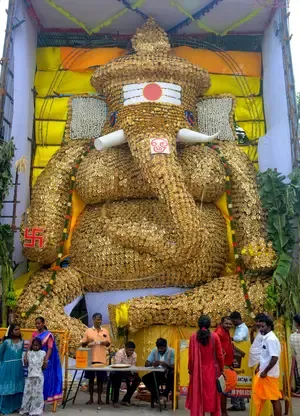How is TNPCB Promoting Eco-Friendly Ganesh Chaturthi Celebrations?

Synopsis
Key Takeaways
- Opt for biodegradable idols made from natural materials.
- Avoid the use of toxic paints and non-biodegradable items.
- Use natural decorations like dried flowers and straw.
- Immerse idols only at designated locations.
- Adhere to TNPCB guidelines for a cleaner celebration.
Chennai, Aug 11 (NationPress) As the festive occasion of Ganesh Chaturthi approaches on August 27, the Tamil Nadu Pollution Control Board (TNPCB) has released a comprehensive set of environmentally friendly guidelines. The board is urging devotees to choose eco-friendly idols and to ensure that immersion practices do not harm local waterbodies.
In their official announcement, the TNPCB stressed that idols must be constructed entirely from natural, biodegradable, and eco-conscious materials, explicitly avoiding any toxic or non-organic substances.
Traditional clay and mud are recommended for idol-making, while the use of Plaster of Paris (PoP), plastic, and thermocol (polystyrene) is strictly forbidden.
The board clarified that only such eco-conscious idols will be allowed for safe immersion in designated waterbodies.
To uphold environmental standards, it also specified that decorations for the idols should utilize components such as dried flowers and straw.
For enhancing the idol's aesthetic appeal, only natural tree resins should be used for shine. “The use of single-use plastic and thermocol in any form is prohibited,” the statement emphasized, highlighting the need to reduce non-biodegradable waste during the festivities.
Additionally, the TNPCB has prohibited the use of toxic and non-biodegradable chemical dyes and oil paints on idols. It recommended that artisans opt for eco-friendly alternatives, such as biodegradable, water-based, and non-toxic natural dyes instead of enamel and synthetic dye-based paints.
To minimize pollution, the board has mandated that idol immersion should only take place at locations specifically designated for each district by local authorities. These guidelines align with the regulations set forth by the Central Pollution Control Board (CPCB), which aim to safeguard aquatic ecosystems from contamination during mass idol immersions.
Vinayaka Chaturthi, one of the most cherished festivals in Tamil Nadu, often sees large-scale installations and immersions of idols. However, environmentalists and civic authorities have raised alarms about the detrimental effects of non-biodegradable materials and toxic paints on lakes, rivers, and coastal waters in recent years.
The TNPCB's initiative is anticipated to foster more sustainable celebrations while preserving traditional practices. The board has appealed to the public, idol creators, and community celebration organizers to diligently adhere to these guidelines and contribute to a cleaner, greener festival.









